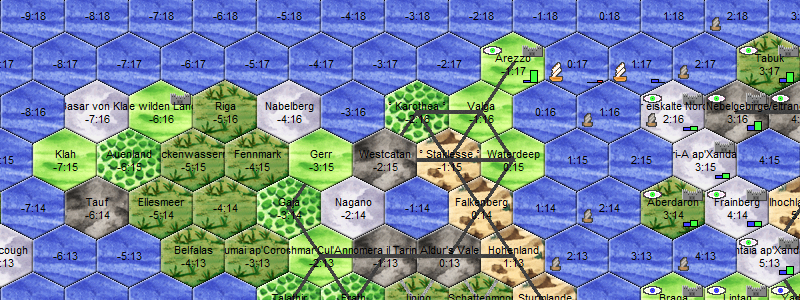
Eressea is a multiplayer turn-based nation-building 4X fantasy game with hundreds of simultaneous players and thousand of individually controlled units.
If you enjoy simulations like Sid Meier’s Civilization, and fantasy games of the D&D variety, Eressea is a mix of both: Each unit in the game is a fantasy character with their own skills, and your goal is to build a viable civilization in competition with hundreds of other players.
Eressea is a very low-tech game. There are no 3D graphics, no online play, and turns take an entire week.
Eressea is a turn-based email game, a descendant of play-by-mail games like correspondence chess. Players control a faction consisting of units, who can be anything from magicians, traders and archers to sailors, blacksmiths and swordsmen. Every week, each player receives an email with a turn report containing describing anything their units can observe about the world, and in response, players send out an email with their orders, that is instructions for what they want each unit to do for the next turn. For example, units can move around, learn new skills, produce resources and goods, or attack other units. Turns are run weekly on Saturday nights, and a program takes the order emails from each player to calculate a new game state. Finally, new reports are generated for each player and sent out, and thus the cycle begins again.
If you’ve ever played correspondence chess, a week per move may sound like an eternity, but consider that you never have more than 16 tokens on the board, and only need to give an order for a single one of them. In Eressea, factions can consist of hundreds of units, each of which needs to be given instructions on what to do. Additionally, players form alliances and diplomatic relations with their neighbors, which require additional emails to be sent and responded to, so there is plenty to do in the course of that week.
In other words, Eressea is a hobby that can take up a considerable amount of time, and by the time we reach turn number 1,400 in 2025, empires will have risen and fallen, and new empires built in the ruins of those first empires, and fallen again. In many ways, Eressea is not so much a game as it is a sandbox that generates stories, and a world with a rich history, in which each player plays a modest part. Most importantly, Eressea is not a game that can be “won” in any classic sense of that word.